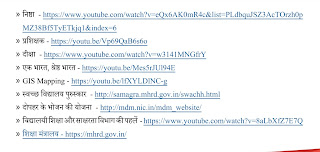Library, KV Basti S-1
PAGES FOR READER'S
- Home
- LIBRARY
- LIBRARIAN
- ACTIVITY
- THOUGHTS
- DDC CLASS
- LIBRARY COMMITTEE
- GALLERY
- PISA
- TOP 10 READER'S
- LIBRARY LEADER
- CLASS VI
- CLASS VII
- CLASS VIII
- CLASS IX
- CLASS X
- XI SCIENCE
- XII SCIENCE
- STUDY MATERIAL
- TEXTBOOKS
- NDLI
- CAREER GUIDANCE
- CURRICULUM
- SQP - 2025-26
- MODEL ANS SHEETS
- शैक्षणिक संसाधन
- e-Library
- NCF - FS
- NCF - SE
- A I
- Rashtriya e-Pustakalaya
NEW ARRIVALS
LIBRARY UPDATES:-
December 22, 2020
December 7, 2020
KNOW MORE & MORE BY SCHOOL LIBRARY
LIBRARY, K V BASTI S-1
Q 1. Oncology is the study of –
1) Birds
2) Cancer
3) Mammals
4) Soil
Q 2. Which was the first Internet service in India?
1) Advanced Research Projects Agency Network
2) Education and Research Network
3) INDNET
4) HINDNET
Q 3. Who coined the term Biodiversity?
1) B. P. Singh
2) Karl Mobius
3) Sir A. G. Tansley
4) Walter G. Rosen
Q 4. Who was the father of Indian Space Programme?
1) Dr. Vikram Ambalal Sarabhai
2) Dr. Satish Dhawan
3) Dr. Homi J. Bhabha
4) Dr. Krishnaswami Kasturirangan
November 19, 2020
November 17, 2020
November 12, 2020
October 20, 2020
October 13, 2020
October 8, 2020
October 3, 2020
October 1, 2020
KNOW ABOUT - World Health Organization (WHO)
LIBRARY, KV BASTI S-1
KNOW ABOUT - World Health Organization (WHO)
Founded on: 7 April 1948. Head Quarter: Geneva, Switzerland Member : 194 Country
WHO began when our Constitution came into force on 7 April 1948 – a date we now celebrate every year as World Health Day. We are now more than 7000 people from more than 150 countries working in 150 country offices, in 6 regional offices and at our headquarters in Geneva.
It's goal is to build a better, healthier future for people all over the world. Working through offices in more than 150 countries, WHO staff work side by side with governments and other partners to ensure the highest attainable level of health for all people. It strive to combat diseases – infectious diseases like influenza and HIV and noncommunicable ones like cancer and heart disease. WHO help mothers and children survive and thrive so they can look forward to a healthy old age. It ensure the safety of the air people breathe, the food they eat, the water they drink – and the medicines and vaccines they need.
WHO's primary role is to direct and coordinate international health within the United Nations’ system. These are our main areas of work:
- Health systems
- Promoting health through the life-course
- Noncommunicable diseases
- Communicable diseases
- Corporate services
- Preparedness, surveillance and response.


















































